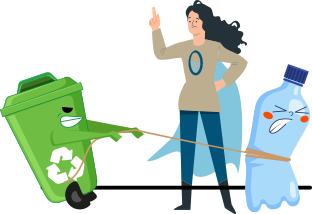Because a plasticized ocean could shatter life on Earth!
We are in a race to zero the impacts
of marine plastic pollution
Because a plasticized ocean
could shatter life on Earth!
We are in a race to zero the impacts of marine plastic pollution
#thecaseforchange

Solving plastics pollution isn’t just about the ocean...

It’s about protecting 50% of our oxygen!
And more! Did you know that THE OCEAN produces over 50% of the world’s oxygen?

Because ocean and atmosphere are connected!
Plastic pollution could interfere with the ocean’s ability to produce oxygen, store CO₂, and much more.
Those and other changes could be catastrophic to life on Earth.

YOU CAN DRIVE CHANGE!
BECOME A HERO TODAY!
#themasterplan
5 steps for a Plastic Free Ocean

FOCUS: Fight plastics in the ocean, not plastics in general.
A world without plastics would have a higher cost-of-living, poorer well-being, and higher resource consumption. That means that "plastic-free" - by itself - does NOT mean more sustainable.
The Racetozero.org Hero embraces intelligent use of plastics and takes an informed approach to relentlessly fight plastics accumulating in the ocean.


PRIORITIES: Landfills are ok for plastics storage (for now).
Plastics stored in landfills are mostly sleeping, threatening NO relevant ecosystem. They remain available for harvest by future advanced recycling technologies.
The Racetozero.org Hero knows that every kilogram of plastic shifted from the ocean (where impact is HIGH) to a landfill (where impact is neglectible) is a HUGE environmental win!
Plastics in landfills can wait further action (for centuries actually). Plastics in the ocean can NOT!

CAUTION: Forced-recycling can be detrimental to reducing ocean plastics
Many recycling projects utilize plastics that would NEVER go to the ocean. Therefore, subsidizing an increase in recycling might have ZERO impact in reducing ocean plastics.
It gets worse. Forced recycling:
(i) consumes funds that could be utilized in projects that avoid much more ocean plastics (e.g., increased collection);
(ii) risks being less sustainable: recycling is an industrial activity with its own environmental impacts;
(iii) provides a false sense of security. If we continue to prioritize recycling, in 10 years we’ll likely be recycling more than ever… while unfortunately having more ocean plastics than ever. Not a good deal.
The Racetozero.org Hero will always ask: Will those flashy recycling initiatives really address ocean plastic? Or are they just smoke & mirrors to avoid having to solve the problem? (which calls for more collection and faster biodegradation).

THE REAL DEAL: COLLECT more waste. Simple but effective.
WasteAid estimates that 1 in 3 people in the world lack waste management services. In many of those cases, plastic found in improperly dumped garbage is washed by wind and rain into rivers and into the ocean.
Poor waste management in the developing world is the leading cause for ocean plastics.
The solution: IMPROVE waste collection. It is that simple. Properly collected plastic does NOT go to the ocean.
The even better news: plastics collected today can be reclaimed by advanced recycling technologies in the future.
The Racetozero.org Hero knows that the most effective initiative to reduce ocean plastics is – by far – international collaboration to help the developing world improve waste management.

THE REAL DEAL: UPGRADE affordable plastics for faster biodegradability.
Most plastics are persistent.
1kg of “normal” plastic that reaches the ocean will continue to exist as 1kg of plastic (or microplastic) for a very long time.
But it doesn’t have to be that way.
Biodegradation additives make it possible for everyday (affordable) plastics to behave a little more like wood and paper:
(i) Durable under normal use (including for the purposes of recycling);
(ii) Biodegradable by natural mechanisms in years
or decades instead of centuries.
No additive
can guarantee full biodegradation in marine
conditions. But that doesn’t make them less valuable
of
a tool. Partial biodegradation is preferable over no
biodegradation at all.
A plastic that biodegrades 20% in a few years will be 20% LESS persistent microplastic for the ocean to deal with.
20% might be the difference between life and death. Every little bit counts.
The Racetozero.org Hero supports ALL technologies with demonstrated potential to help plastics biodegrade faster while remaining durable under normal use.

MORE COLLECTION
FASTER BIODEGRATION
LESS DISTRACTIONS
LESS EXCUSES
#takeaction


AS A CONCERNED CITIZEN AND CONSUMER


AS A COMPANY


AS A GOVERNMENT
Donate a bit of your time to contact companies and government. Ask which actions they have in place to INCREASE COLLECTION (remember 1 in 3 people in the world lack proper waste management) and which actions they have in place to IMPROVE BIODEGRADATION (PEW estimates that reduction, recycling and improved infrastructure will leave 5 million tons of plastics entering the ocean EVERY year, they must be less eternal).
If the answer isn’t convincing (like "we support recycling" or "we use less plastics"), ask them to visit racetozero.org and familiarize themselves with #TheMasterplan, share now Facebook Twitter Instagram . Your voice and actions as a concerned citizen can be transformational. Please don’t forget to share and subscribe!
Consider prioritizing your projects GLOBALLY
using the metric:
[kgs of persistent
ocean
plastics avoided per $ invested]
Challenge your sustainability teams to demonstrate how existing innitiatives (and commitments) DIRECTLY address ocean plastics.
Remember that – for regions with proper waste management – “less plastics” and “more recycling” will have VERY LITTLE effect into reducing ocean plastics. Time and money invested in those efforts would be of greater impact if globally leveraged to COLLECT MORE and advance technologies that help BIODEGRADE FASTER.
If your country has proper waste management, be very careful with recycling and anti-plastics-related incentives. Those are likely to increase environmental impacts without benefit to ocean plastics. Consider international collaboration to help developing countries improve their collection infrastructures and reduce use of persistent plastic in leakage hotspots. Support the development and implementation of biodegradation additives.
If your country doesn’t have proper waste management, map the hotspots (regions more likely to generate ocean-bound waste) and request international support to (i) close the infrastructure gap, (ii) reduce and replace persistent plastics that are likely to leak into the ocean and (iii) implement reputable biodegradation additives.


Subscribe to receive updates
Recetozero.org will process the personal data you have provided in accordance with Racezero.org’s privacy. The privacy policy contains more information about how your personal data is used, including how hover your personal data is shared and your legal rights in respect of your personal data.
Racetozero.org accepts no liability for the up-to-dateness, correctness, completeness or quality of the information provided.Recommended actions are intended to provoke candid dialogue. Plastic in the ocean is a controversial topic. Concepts are not universally true. Continuous improvement is expected as change is the only constant.
© 2022 Racetozero.org
Racetozero.org uses cookies to give you the best experience, analyze website traffic, and provide you with features available on social networks. To learn more about how we use your personal data, please see our privacy policy. If you continue to use this racetozero.org assumes that you are happy with it.









